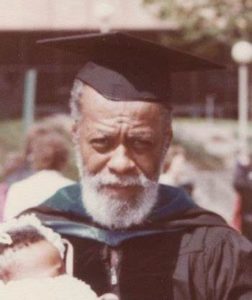
Edward Crosby
*Edward Crosby was born on this date in 1932. He was a Black professor and administrator emeritus.
Born and raised in Cleveland, Ohio, Edward Warren Crosby was the fourth child of Frederick Douglass and Marion G. Crosby. He attended Cleveland's Our Lady of the Blessed Sacrament parochial and St. Edward's Catholic high schools. Initially a straight "A" student and an aspiring priest, Crosby's academic performance began to suffer. He met Shirley R. Crosby of Kent, Ohio, and they were eventually married.
He served in the United States military and was stationed in England. Crosby earned a B.A. in Spanish, an M.A. in German from Kent State University, and a Ph.D. in medieval German languages and literature and medieval history from the University of Kansas in 1965. In 1957, he began teaching at Kent State and held teaching positions at other institutions, including Hiram College, Tuskegee Institute, Southern Illinois University, and the University of Washington.
At Kent, there were several demands that students had placed on the table, including a Black Culture Center. The center underwent several phases before finally ending up in the Old Student Union, now Oscar Ritchie Hall. He visualized the center and the institute as institutions that should work in tandem with each other. Crosby founded and served as the Director of the Institute for African American Affairs (I.A.A.A.) from 1969 to 1976. In 1976, the institute petitioned Kent State for departmental status, which gave birth to the Department of Pan-African Studies (D.P.A.S.); thus, Dr. Crosby served 18 years as the department's first chair.
The Center of Pan-African Culture was established in 1970 through the combined efforts of Crosby, his staff, and the Black United Students at Kent State leaders, providing a home for students to engage in cultural activities and a home for I.A.A.A. The I.A.A.A. used a holistic curriculum model based on Crosby's previous work at Southern Illinois University, Edwardsville (S.I.U.E.). The curriculum he developed for the I.A.A.A.'s Experiment in Higher Education program was similar to another upstart program at the time, Upward Bound. Both focused on post-secondary readiness for students from urban areas with low high school graduation rates, with the E.H.E. tailored for specialized aptitude testing and instruction of comparably lower-performing students.
E.H.E. teachers received training as counselors and employed an "Each One Teach One" methodology wherein students instructed each other. The E.H.E. curriculum also actively sought to validate the culture of its students, utilizing examples, situations, and language familiar to students to teach subject matter they would encounter at any university. The I.A.A.A. is still a community development and research institute at Kent State.
His work in black education began in East St. Louis, Illinois. One of the lessons of East St. Louis was the importance of an interdisciplinary, holistic approach to Black education. East St. Louis E.H.E. partnered with Katherine Dunham's Performing Arts Training Center (P.A.T.C.). The symbiotic relationship between E.H.E. and P.A.T.C. attracted educators and cultural icons from all over the U.S. and beyond. On arriving at Kent, knowing the value of this kind of symbiosis, Crosby created a cultural center that could work with the newly formed Institute for African American Affairs (I.A.A.A.). For 23 years, this dual institution provided an environment that reaffirmed the value of African American culture with the academic skills necessary to graduate from a four-year institution in the study and statement of this culture. Implementing this kind of Black pedagogy has led to the successful graduation of hundreds, if not thousands, of students.
Many have devoted their careers to working in Black communities. Soon after arriving at Kent State, he became one of the key organizers of the first celebration of Black History Month in the U.S., which occurred in 1970. Significantly, the first celebration was a Pan-African affair that included the participation of cultural icons such as Babatunde Olatunji and Gwendolyn Brooks, as well as poets Eugene Redmond and Quincy Troupe. Due to the budgetary allocations for the Institute, Crosby used innovative methods of curricular delivery, including, but not limited to, videotaped lectures, films, and a method of "Each One Teach One ."
All three of these methods at Kent facilitated the development of courses that graduate assistants could teach. This is how he developed a cadre of professors dedicated to Pan-African Studies. Other technological innovations included desktop computers in the main office and one of the first computer labs for student use in an academic area unrelated to science or business classes.
He spent the latter days of his career teaching Black Cosmology in the Department of Pan-African Studies at Kent State University. He retired from Kent in 1994 but founded the Ida B. Wells Community Academy (I.B.W.C.A.)—a charter school. Edward Crosby died on February 10, 2021. The Center of Pan-African Culture still exists in a newly renovated Oscar Ritchie Hall.